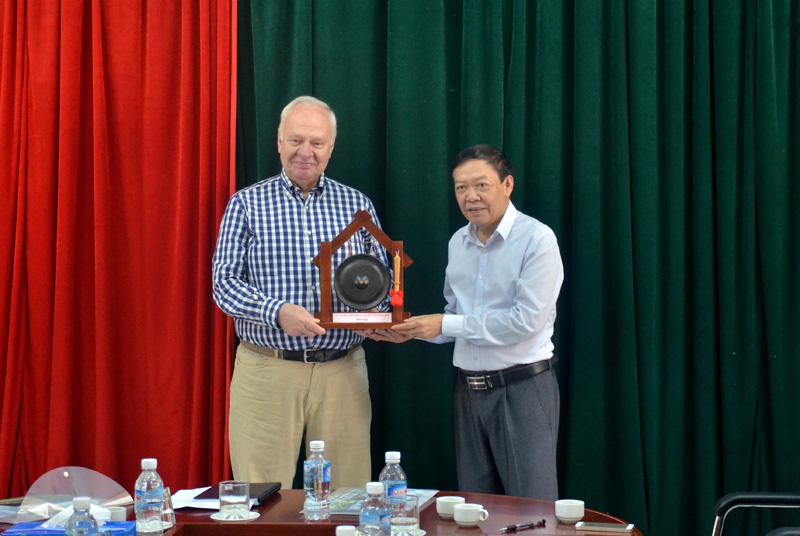
(HBO) – Under a tourism cooperation programme, the Department of Culture, Sports and Tourisms of the northern province of Hoa Binh and the Hanoi Department of Tourism joined hands with Sunsmile Travel Vietnam Company Limited to organise a fact-finding team to build a Hanoi-Hoa Binh tour.
The team was joined by Konstantin Vnukov, Ambassador of Russia to Vietnam and his spouse, along with staff members of the Embassy of Russia in Vietnam and the Hanoi Department of Tourism.

Bui Ngoc Lam, Director of the Hoa Binh
Department of Culture, Sports and Tourism presents a Muong gong to the Embassy
of Russia.
At a working session, Director of the
provincial Department of Culture, Sports and Tourism Bui Ngoc Lam stressed the
long-term friendship between Russia and Vietnam and Hoa Binh province in
particular, as well as the province’s tourism potential and strengths.
The Hoa Binh hydropower plant, built on
the Da river, is a construction of the century and a proof of the friendship
between the two countries. More than 1,300 experts from the Soviet Union (currently
Russia) and 40,000 Vietnamese engineers and workers participated in the
construction of the plant, contributing to the country’s industrialisation and modernisation.
After the trip, the delegation is expected to introduce Hoa Binh to
international friends, especially Russian tourists.
On behalf of the delegation, Ambassador
Konstantin Vnukov thanked the host for their warm welcome. He said this visit
was not his first in Hoa Binh and each gave him a different feeling. Hoa Binh
is not only marked as the place of special friendship between people of the two
countries, but also as a place of charming natural landscape and great tourism
potential, he said.
The Russian Embassy will work to bring
more foreign tourists, including Russian visitors, to Vietnam and Hoa Binh province.
On the occasion, leaders of the tourism
departments of Hoa Binh and Hanoi presented souvenirs to the Russian Ambassador
and staff members of the embassy.
Afterwards, the delegation paid a visit to
Ke hamlet in Hien Luong commune (Da Bac district), met with families operating
homestay services and watched traditional art performances. The delegation then
came back to Hoa Binh city to visit the Hoa Binh hydropower plant./.
Hoa Binh province is undergoing a dynamic transformation amid Vietnam’s national digital transition. Building on Poliburo’s Resolution No. 57-NQ/TW on breakthroughs in science, technology, innovation, and national digital transformation, the province has rolled out a wide range of practical action plans. A standout initiative is the "Digital Literacy for All” movement, an effort to ensure that no one is left behind in the digital era.
Hoa Binh province is undergoing a dynamic transformation in the wake of the national digital transformation movement. Building on Resolution No. 57-NQ/TW of the Politburo on breakthroughs in science, technology, innovation, and national digital transformation, the province has implemented a wide range of practical action plans. A standout initiative is the "Digital Literacy for All” movement ambitious effort to ensure that no one is left behind in the digital age.
With a spirit of unity and proactive problem-solving, the Party Committee, the government and the people of Dong Lai Commune (Tan Lac District) have made great strides in implementing the resolutions of the 24th Party Congress of the commune for the 2020 - 2025 term. Focusing on leadership and practical actions, the commune has brought the Party’s resolutions into daily life, creating strong impacts and pushing the local development forward.
Amid the nationwide push for digital transformation, young people in Hoa Binh Province are stepping up as dynamic pioneers, applying technology to enhance Youth Union operations and expand the reach of youth-led initiatives. Through creativity and adaptability, Youth Union organizations at all levels have introduced a series of practical solutions, contributing to modern governance and community development.
In recent years, An Nghia commune, located in Lac Son district, has stepped up administrative reform, focusing on improving the quality and efficiency of its single-window service unit for receiving and processing administrative procedures. These improvements have helped create favourable conditions for local residents and organisations to handle administrative procedures, contributing to the commune’s broader socio-economic development.
The Prime Minister-approved master plan to develop the multi-use value of forests ecosystems through 2030, with a vision to 2050, aims to improve the management and sustainable use of forest resources, create jobs, increase incomes, and improve the living standards of ethnic minorities, people in mountainous and remote areas, forest workers and those living near forests.



